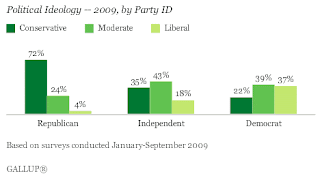Consider, for instance, the 39 Democrats who voted against the bill in the House, which approved the health care bill by a margin of 220 to 215. According to data compiled by The New York Times, 31 of the 39 Democratic naysayers hail from districts that John McCain won last November. Although the upper chamber has a reputation for being less rigidly constrained by near-term political considerations, odds are that the same calculus will prevail in the Senate.Thus the opinions of the electorate on health care are trumped by their feelings about Obama:
The authors sum up the dynamic:
Nowadays, President Obama enjoys higher approval ratings — in the low to mid-50s, according to most polls — than do the Democrats’ health care reform plans, which are mired in the mid-40s in most surveys. Conditions being what they are, Democrats would rather have a referendum on the president than one on the health care bill itself.
Still, what these numbers seem to reflect is a series of missed connections. On the one hand, there is a disconnect between Mr. Obama and the electorate: the president — who had popularity ratings in the 60s when the health care debate began — has generally stayed in the background during health care negotiations, leaving the unpopular Congress to be the public face of the bill.
On the other hand, there is a disconnect between the electorate and the 535 members of Congress, who seem to be so fixated on Mr. Obama’s standing in their states that they’ve paid little attention to what their constituents might want — or need.
This actually makes the problem solvable. Not so much by Obama, but by the national Democratic Party - in particular by its Blue Dog and Labor-liberal components. Much if not most of what passes for conservatism in this country is populist anti-leftism.
Based upon cultural and geographical commonality the outreach would have to be done by an ideologically balanced organization anchored in civic culture and working on the basis of civic responsibility.
The effort would also have to be independent of Obama.
Quite frankly the various progressive activist groups (MoveOn, et al) and Obama's Organizing for America would be detrimental in such an effort. In the absence of campaign discipline, Obama's current volunteer operation is Howard Dean, redux, precisely the kind of dysfunctional operation recognized as counterproductive in 2008.

